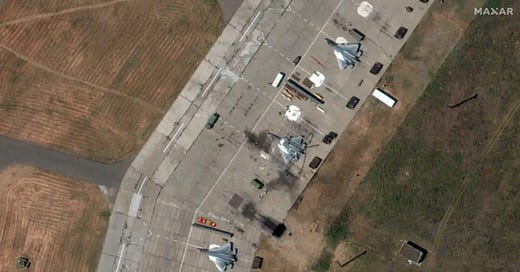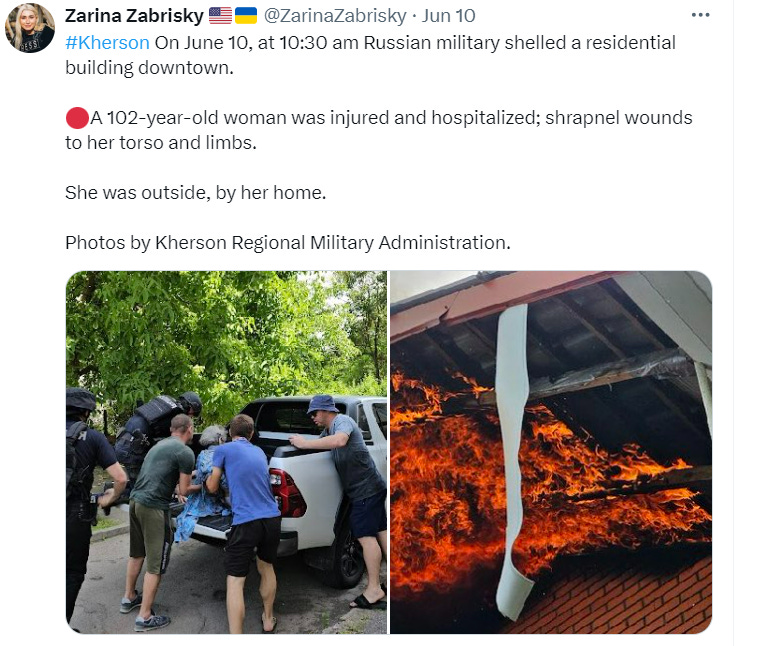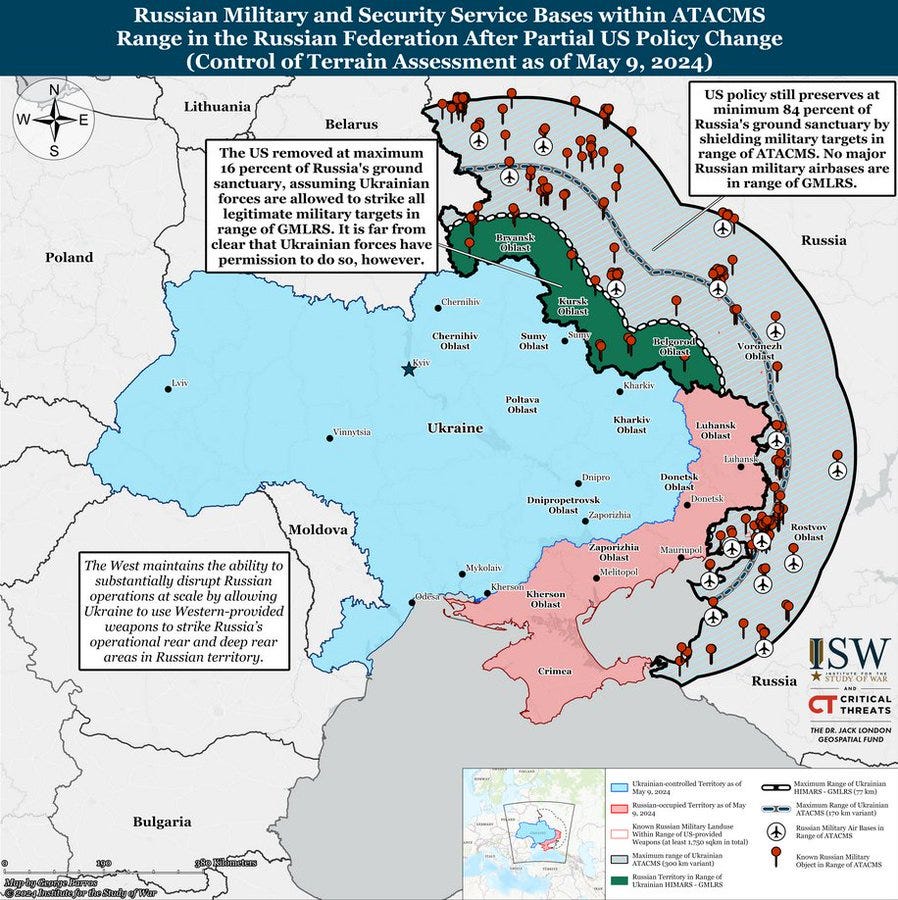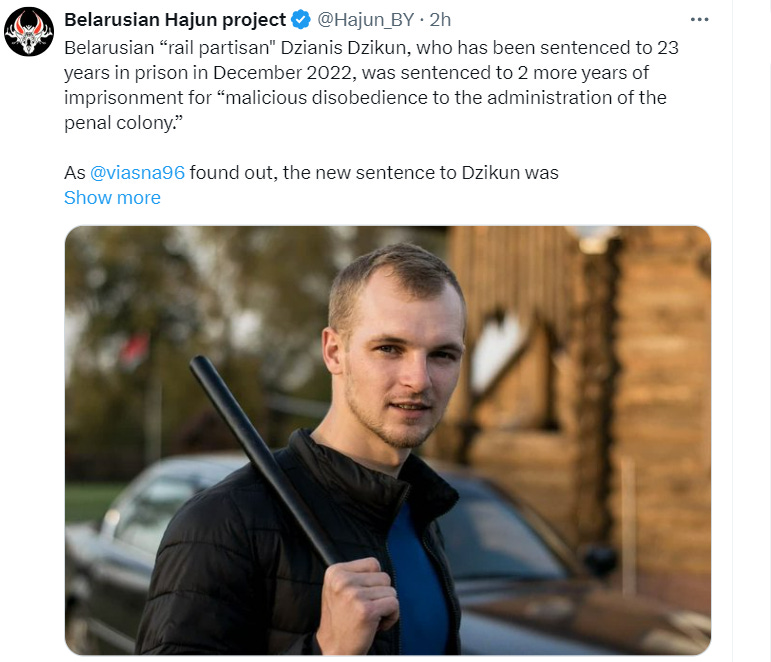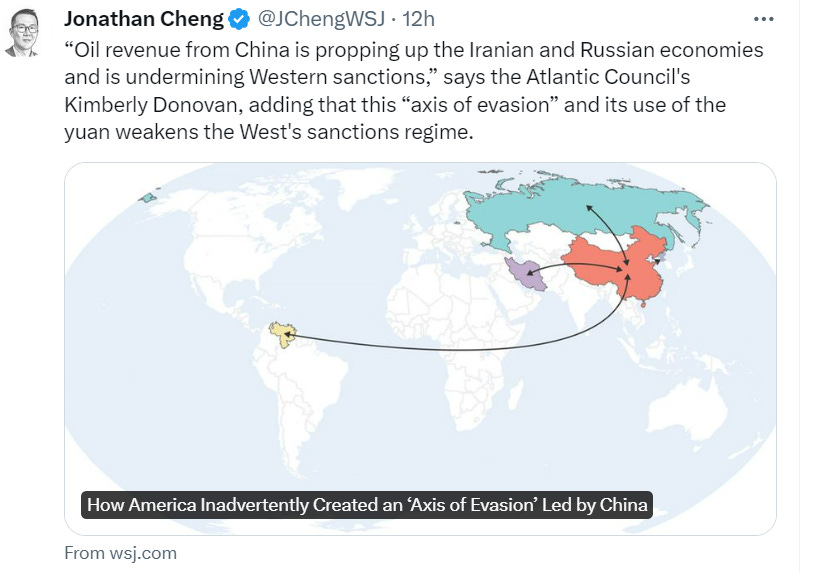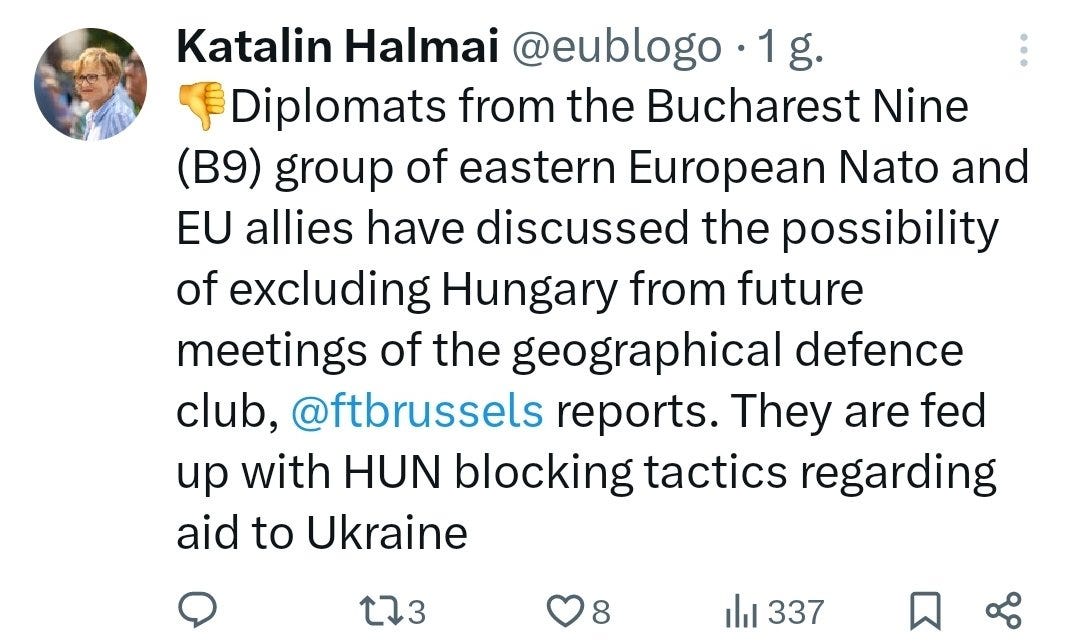Jun 11: E-Stories
RUattacksUA CombatSit BehindLines InRussia Allies A&P DFRLab Tocci Zabrisky ISW UKDef CDS NoelReport Mak Weiss Avdeeva Blackwell Christie HajunProject Sumlenny Cheng Pichler SpyCast
Catching up…
EA Worldview’s Ukraine Up-date- hop over to Scott’s amazing hourly Ukraine up-date page. I’ll fill in with some bits and bobs.
Stories we’re following…
Russia strikes Kharkiv with glide bombs, injuring 8 people. Russian forces launched three glide bombs at Kharkiv on June 10, injuring eight people, local authorities reported.
Russian attacks on Kharkiv, Kherson oblasts kill 1, injure 3, including 102-year-old woman. Russian troops attacked the Derhachi community in Kharkiv oblast and the city of Kherson on June 10, killing one man and injuring three people, the local authorities reported.
NGO Save Ukraine rescues 17-year-old girl from Russia. "Despite a number of difficult challenges, the Save Ukraine team managed to make every effort, and the abducted girl is finally on her native Ukrainian land."
Report: Russia's war has caused over $56 billion in damage to Ukraine's energy sector. Russia's full-scale invasion has inflicted $56.2 billion in damage to Ukraine's energy sector as of May 2024, according to the Kyiv School of Economics (KSE) report published on June 10.
Combat Situation Update
Ukrainian strikes on Russia have helped reduce attacks on Kharkiv, mayor says. Ukrainian forces have struck missile launch positions in Russia, helping to reduce the number of Russian attacks on the embattled city of Kharkiv, Reuters reported, Mayor Ihor Terekhov.
WaPo: US lifts weapons ban for Ukraine's Azov Brigade, WP reports. The United States will allow Ukraine's Azov Brigade to use weapons provided by the U.S. to fight Russia's full-scale invasion, the U.S. State Department announced on June 10, reversing a long-standing policy.
Partisan movement ATESH reports that Russian Armed Forces air defense servicemen in Crimea have been instructed to evacuate their families to military camps in the Southern Military District. This directive coincides with the relocation of air defense systems to the Bilhorod region, raising security concerns in occupied Crimea due to reduced coverage. Additionally, the Russian military is forming new mobile air defense teams using ZU-23-2s to counter UAVs, indicating a strategic shift towards this area, with a reduced focus on occupied Crimea.
Russia media report that a Su-34 fighter jet crashed in the mountainous area of North Ossetia due to a technical malfunction. The crew members did not survive.
The Ukrainian general staff reports that in the Pokrovsk direction, a Russian Su-25 fighter jet was shot down.
Ukraine hit Russian S-400, S-300 systems in occupied Crimea overnight, General Staff says. "None of our missiles fired were intercepted by the enemy's 'highly effective' air defense," the General Staff said.
Ukraine confirms attack on Novoshakhtinsk oil refinery, claims damage totalling $540 million. The military said the attack had been carried out by "Ukrainian-made means," but did not elaborate.
Russian ship Admiral Levchenko on fire in Barents Sea, Ukrainian official claims. Russian anti-submarine ship Admiral Levchenko is burning in the Barents Sea after an engine malfunctioned and caught fire, Dmytro Pletenchuk, press chief for the Southern Defense Forces of Ukraine's Armed Forces, said on June 10.
UK Ministry of Defence: Since the start of the war, Ukraine has re-captured approximately 50% of territory illegally seized by Russia and destroyed 50% of their land combat power.
The Warzone released satellite images of the Su-57 that was attacked on the night of 7-8 June. It shows damage to at least one Su-57 Felon fighter jet.
"The blast and especially the shrapnel from such a nearby detonation would have very likely riddled the plane with holes and caused other damage," they write.
Russian Air Force affiliated channel Fighterbomber makes the story about the damaged Su-57 even better: not one but two Su-57 were damaged.
"In order not to get up twice, I will say that two Su-57s were damaged. The second Su-57 received minor damage, which will be repaired on the spot."
On June 9, a missile strike targeted Russian utility buildings in Tsentral'noye, Rakityansk district, Bilhorod region, 30 km from the Sumy region border.
The buildings stored engineering equipment and ammunition for the "North" group of troops. The attack, carried out using two HIMARS MLRS missiles, resulted in the destruction of five URAL-4320 vehicles and one BTR-82AM, with two additional URAL-4320s damaged. Approximately 5,000 units of engineering ammunition, including TM-62, PMN-2, MON-50, OZM-72, and TNT checkers, were lost due to the missile strike and secondary detonations.
Jun 10: A missile strike was carried out on the command post of the Russian 6th Combined Arms Army (military unit 31807, Leningrad region). The command post was deployed at the Nezhegol recreation center (owned by Bilhorod State University) near the village of Shebekino, Bilhorod region and was in charge of units participating in the offensive operation in Vovchansk, Kharkiv region. Currently, eight Russian officers are considered missing.
Russia uses submarines to patrol Black Sea after naval losses, military says. Russia started using submarines to patrol the Black Sea after a number of ships were attacked by Ukraine, Dmytro Pletenchuk, a spokesperson for the Southern Defense Forces, said on national television on June 10.
Behind the Lines
Ukraine to directly sign contracts with global arms producers. "This is a new stage of cooperation that will allow us to receive modern arms directly from producers, which will certainly contribute to faster and more efficient modernization of Ukraine's Armed Forces," Deputy Defense Minister Dmytro Klimenkov said during the Balkan-Ukrainian Defense Industries Forum in Bulgaria on June 7.
A Russian intelligence operative who’s leading a Kremlin disinformation campaign in Africa has helped run influence operations in Europe for years, according to documents seen by Bloomberg and government officials familiar with the matter.
Artem Kureyev, identified as a Russian Federal Security Service agent in an Estonian court case in 2022, has had frequent contacts with at least half a dozen European journalists, arranged and covered travel costs for some of them to visit occupied territories in Ukraine, and at times appears to have offered to pay for planted news articles, the documents show.
On other occasions he has adopted more subtle methods to try to sway coverage, by arranging interviews, flagging and debating topics in the news or organizing press events.
The documents provide deep insight into the operations and methods of one Russian intelligence operative involved in influence campaigns in Europe. There will be many others like him running similar operations across the continent and elsewhere. [continue]
Switzerland encounters rise in cyberattacks and disinformation prior to upcoming Ukraine summit. In the lead-up to the global summit on Ukraine's peace formula, Switzerland has experienced a rise in cyberattacks and disinformation, Swiss government representatives reported on June 10.
Russia is outsourcing operations to locals: Poland’s government has been vocal in its warning about the risk of covert operations by Russia and said it is planning to invest more in the country’s security agencies and take other measures to counter that rising threat.
On May 27, Polish Foreign Minister Radoslaw Sikorski announced the introduction of restrictions on the movement of Russian diplomats on its territory, citing evidence that the Russian state is involved in authorising sabotage operations on its soil.
This followed a series of announcements by the prime minister. On May 14, Donald Tusk announced his government would invest an additional 100 million zloty (about 23 million euros) in Poland’s security agencies, as well as reverse a decision made under the previous Law and Justice (PiS) government to shut down regional branches of the Internal Security Agency (ABW), the institution in charge of combatting covert activities and terrorism.
To justify his decisions, the prime minister said there was a “growing threat in Europe and in Poland regarding the aggressive actions of the Russian and Belarusian intelligence services”. The scale of these actions has of late become “bigger and more disturbing”, he added, informing that, in recent weeks, Poland had prevented “attempts at direct action, including sabotage and attempted arson”.
Czech PM suspects Russia’s involvement in foiled arson attack on Prague buses. Czech Prime Minister Petr Fiala said on June 10 that Russia may be linked to an attempted arson attack on Prague city buses last week.
BBC: An appeal has been launched for O blood-type donors to book appointments across the country following the ransomware attack affecting major London hospitals.
The IT attack means the affected hospitals cannot currently match patients' blood at the same frequency as usual. Several London hospitals declared a critical incident, cancelled operations and tests, and were unable to carry out blood transfusions last week after the attack on the pathology firm Synnovis, which Qilin, a Russian group of cyber criminals, is understood to have been behind.
King's College Hospital, Guy's and St Thomas' (including the Royal Brompton and the Evelina London Children's Hospital) and primary care services in London declared a critical incident after last week's IT attack.
Prof Stephen Powis, medical director for NHS England, said staff were going "above and beyond to minimise the significant disruption to patients".
He added: "We know that a number of operations and appointments have been postponed or diverted to other neighbouring hospitals not impacted by the cyber-attack, as we prioritise pathology services for the most clinically urgent cases."
Belarus to participate in Russia's nuclear drills. Belarus will participate in the second stage of Russian drills simulating the launch of tactical nuclear weapons, Belarusian Defense Minister Viktor Khrenin announced on June 10.
Meanwhile in Russia
UK Defence Intelligence: On 28 May 2024, Ukraine’s Defence Intelligence (HUR) reported that Russia has intensified attempts to recruit Africans to fight in Ukraine. In particular these recruitment efforts focus on the central African countries of Rwanda, Burundi, Congo, and Uganda. Russia is reportedly offering a sign-up bonus of $2000, monthly pay, $2,200 and the promise of a Russian passport.
The recruitment campaign is likely to replace Russian battlefield losses, which are significant, and to sustain offensive activity in multiple axes across the front. With Russia’s finite pool of convict recruitment likely culminated, Russia is likely expanding its recruitment across the global south to avoid additional mobilisations within Russia itself. As well as being domestically unpopular for President Putin and the Russian government, the previous mobilisation for the war resulted in a record labour shortage and exodus of skilled workers such as doctors and IT professionals.
The Russian Central Election Commission will share its "positive experience in digitalizing the electoral process" with the colleagues from Kazakhstan.
“We will gladly not only share our positive experience, but also openly talk about our work on mistakes, which, naturally, are inevitable in a lot of work. At the same time, we will be glad if you share your achievements,” quotes the chairman of the Central Election Commission of the Russian Federation as saying Ella Pamfilova press service.
The CEC of Russia will host a three-day seminar on issues of digitalization of the electoral process for the delegation of the CEC of the Republic of Kazakhstan. Representatives of the Central Election Commission, the Ministry of Digital Development, Rostelecom , the Moscow government and the Moscow City Election Commission will take part in it .
AP: The government of the Central African Republic suspended a Chinese mining company’s operations in the country, accusing it of cooperating with armed militias, a government decree said.
The country’s ministry of mines accused Daqing SARL, a Chinese gold and diamond mining company, of “intelligence with armed groups, illegal exploitation, illegal introduction of foreign subjects into mining areas, non-payment of taxes and lack of activity reports,” in the decree, which was made public Saturday.
Daqing SARL operated in Mingala, a town in the south of the Central African Republic that has been plagued by fighting between the country’s armed forces and the Coalition of Patriots for Change, an anti-government armed group.
Bucharest Nine: Finland, Sweden in, Hungary out?
AP: NATO's eastern flank leaders will have a more coordinated approach towards supporting Ukraine after the Hungarian president stayed away from their summit in Riga, Latvian President Edgars Rinkevics said on Tuesday.
The split emphasizes diverging approaches to Russia and Ukraine among central European nations, amid Hungarian Prime Minister Viktor Orban's continued close ties to Russia and refusal to give arms to Ukraine.
Rinkevics said Hungary's President Tamas Sulyok cancelled his trip to the summit of the Bucharest Nine, a group of European countries on the eastern edge of NATO, at the weekend.
"The most important thing is that we have a more coordinated approach to the (NATO) Washington summit, when it comes to support for Ukraine, when it comes to strengthening the alliance’s capabilities", Rinkevics said ahead of the meeting.
Allied Support
EU Commission president, Ursula von der Leyen’s comments at the Ukraine Recovery Conference in Germany.
"Russia fights to end Ukraine. Ukraine fights to end the war. Russia fights for the past. Ukraine fights for a better future. Putin must fail. Ukraine must prevail. And we must help Ukraine to rise from the ashes and be master of its own future."
European Commission President Ursula von der Leyen announced at the Ukraine reconstruction conference that €1.5 billion of income from Russian assets will be confiscated in July. Additionally, the EU will provide Ukraine with €1.9 billion this month under the Ukraine Facility program.
Von der Leyen, confirmed that Ukraine has completed all the necessary steps to start negotiations on joining the EU by the end of this month.
Noel Report: At the opening ceremony in Berlin, President Zelensky outlined plans to restore all energy facilities before winter, wherever possible. He noted that the Russian Federation had destroyed 9 GW of Ukraine's energy capacity, despite last winter's peak consumption being 18 GW.
He highlighted the urgent need for at least seven Patriot air defense systems to bolster Ukraine's defenses and said that Putin would not pursue an honest peace until Russia is prevented from terrorizing Ukraine.
Italy is preparing a €140 million support package for Ukraine, Italian Foreign Minister Antonio Tajani confirmed in Berlin. He noted that the funds will be directed to reconstruction as well as the railway infrastructure of Ukraine.
Dutch Defense Minister arrives in Kyiv in surprise visit. Dutch Defense Minister Kajsa Ollongren and Prime Minister Denys Shmyhal discussed Ukraine-Netherlands joint defense production, the exchange of technologies, the upcoming global peace summit in Switzerland, and Ukraine's Euro-Atlantic integration.
Germany will transfer its third Patriot air defense system, as well as IRIS-T and Gepard anti-aircraft systems, missiles, and ammunition, to Ukraine in the coming weeks and months, German Chancellor Olaf Scholz said on June 11 in Berlin during the Ukraine Recovery Conference.
"Putin must realize that there will be no military victory and peace in the form of dictates. He must stop his brutal campaign and withdraw his troops," German Chancellor Scholz said at the opening of the Ukraine Recovery Conference 2024.
In rare defense investment, Ireland will spend around $13 million to replenish EU arms stocks. Ireland is not a member of NATO, and has one of the lowest rates of defense spending across the EU, at around .2% of its GDP.
Foreign Policy: China owns farmland properties in the US located near military bases.
National security experts warn that some of those purchases are too close for comfort.
The Biden administration issued an order this week forcing a Chinese-backed cryptocurrency mining firm, MineOne, to divest from land it owns in Wyoming that just so happens to be very close to a U.S. Air Force base that houses nuclear weapons.
What has national security officials and lawmakers in Washington rattled is not the net amount of land owned by Chinese investors—349,442 acres, or less than 1 percent of that total foreign-owned land—but rather where some of that land is. Namely, uncomfortably close ]to U.S. military bases and other national security installations.
This isn’t the first such incident. In 2023, a Chinese food producer, the Fufeng Group, bought 370 acres of land near an Air Force base in North Dakota, spurring the Biden administration to issue a new rule that any foreigners wanting to buy land within 100 miles of a U.S. military base or other national security installation needs to first go to the U.S. government for approval.
In 2023 alone, 33 states proposed at least 81 bills related to restricting Chinese ownership of U.S. land on national security grounds, as tallied by a study conducted by the Chicago Council on Global Affairs. [continue]
Deception…
DFR Lab, Another battlefield: Telegram as a digital front in Russia’s war against Ukraine
In the more than two years since Russia began its full-scale invasion of Ukraine, no platform has expanded its role in helping the outside world to understand the Russian perspective on the war more than Telegram. Launched by Russian entrepreneur Pavel Durov in 2013, the messaging platform rapidly grew in popularity, eventually gaining primacy in Russian social media discourse. Its influence was solidified in the first months of the war, as the Kremlin cracked down on Western social media platforms while continuing to tolerate Telegram and utilize it for its own purposes. This has propelled Telegram into one of the last remaining windows for observing and understanding Russian thinking about the war, from the general public to the Kremlin itself.
Nathalie Tocci: Europe is beset by global threats. How will a destabilised EU cope with them?
The challenges facing Europe are dramatic. War on the continent, the spiralling climate crisis, a brewing trade war between the US and China, the trampling of international law in the Middle East and Europe’s tattered reputation in the global south will all top the European policy agenda in the months ahead. Whatever the political machinations in Europe, the external context will shape Europe’s policy priorities; governments and institutions will not be able to shy away from them.
The EU’s internal political dynamics make a world of a difference to how it collectively goes about addressing these priorities. There is a huge difference between on the one hand, prioritising spending on national defence policies and on the other, putting real money into retooling the European economy and public spending for collective European defence. A more right-leaning EU, even slightly so, will have a much harder time agreeing on meaningful steps towards defence integration, underpinned by a significant new EU defence fund.
There is also a categorical gap between an EU agenda that doubles down on protectionism against China, and one that invests in green and digital technologies. A more nationalistic and less green union may be happy to collectively raise Europe’s tariffs on Chinese products and restrict Chinese investments. But it would hardly want to fund a European industrial policy even if that is what is needed to allow the EU to be competitive on the energy and digital transitions, let alone to make any progress on agriculture reforms needed to achieve environmental protection and climate goals.
Enlargement of the EU beyond its current membership of 27 countries, potentially to as many as 35, could be pursued by following an exclusively geopolitical rationale and seeing the EU’s widening as the flip side of its internal dilution. Or it could be an opportunity to undertake far-reaching institutional reforms, both within the candidate countries and in the EU, for instance by scrapping the right of countries to use their veto to block decisions, in other words widening and deepening at the same time. A more Eurosceptic EU would be happy to proceed with the former – widening and loosening – but certainly not with the latter.
Finally, it is one thing to address the concerns of the global south by recommitting to international law and significantly increasing climate finance. It is quite another to pursue short-term mercantilist funding deals aimed at stopping migration. The EU’s standing in the eyes of the global south has already plummeted over the past few months. A more illiberal EU would neither have the political will nor the credibility to talk about human rights and international law in most corners of the world.
The European elections may not have led to the worst form of rightwing surge. But it’s a bittersweet sigh of relief. Coming out of these elections in only a marginally worse position than we entered them in is a meagre consolation given Europe’s dramatic predicament.
SpyCast: “U.S. Army Open-Source Intelligence (OSINT)” – with Dennis Eger & Shawn Nilius
In our modern age of technology and internet information overload, open-source intelligence has emerged as one of the fastest-growing and most notable –INTs in the intelligence field. Tune in to learn more about this fascinating form of information collection and how it’s been successfully utilized by the US Army.

